
SPEAKERS
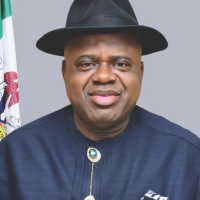
H.E. Senator Diri, Executive Governor of Bayelsa State since 2020, has a rich history in politics and governance. He served as a federal lawmaker in Nigeria’s House of Representatives and Senate, where he advocated for sustainable development policies. As governor, he champions environmental conservation, particularly through initiatives like DeltasUNite, and serves as the Lead of Global Governance Committee for the United Nations Convention for Conserving River Deltas (UNCCRD), addressing climate resilience and ecosystem protection in delta regions. His administration focuses on community-driven strategies for biodiversity preservation, sustainable livelihoods, and regional collaboration, blending his legislative experience with a commitment to environmental and socio-economic stability.

Dr. Bhichit Rattakul is a Thai scientist and public administrator specializing in science and disaster resilience. He currently serves as the President of the Thai Network for Disaster Resilience (TNDR) and advocates for disaster risk reduction.
He has a distinguished career in public service, serving as the Governor of Bangkok (1996 – 2000) where he led several urban governance and development initiatives. He also served as the former Executive Director of the Asian Disaster Preparedness Center (ADPC), fostering and strengthening regional disaster resilience. His leadership and expertise spans multiple domains, including environmental protection, disaster risk reduction, and sustainable urban management.
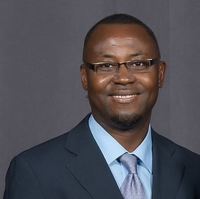
Dr. Augustine Arukwe is an environmental scientist at the Department of Biology, Norwegian University of Science and Technology (NTNU) Trondheim and European registered toxicologist. His experience and research has addressed and still addresses issues of impact/risk assessment and the general stress of contaminants, including endocrine modulators in wildlife species and how quantifiable variables of climate change affect contaminant effects and dynamics in the environment. He is extensively involved in several capacity building projects in Nigeria, Tanzania, South Africa and Vietnam
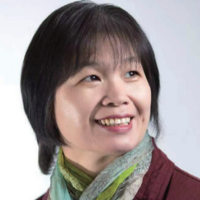
Dr. Xiuzhen Li‘s research interest lies in coastal wetlands ecology, with special focus on the mechanism of ecological restoration and blue carbon in saltmarshes. As project leader, she has conducted more than 10 National level projects sponsored by the Ministry of Science & Technology and National Natural Science Foundation of China. She has published more than 150 papers in internationally recognized journals and monographs, some of which were cited by IPCC report. She served as editorial board member for international journals such as Ecological Engineering, Ocean & Coastal Management, etc. She also serves as Executive Committee member for Future Earth Coasts, and was elected as vice chair for the Ecological Society of China. She is the contact person for the Mega-Delta Programme endorsed by the UN Ocean Decade in June, 2021.
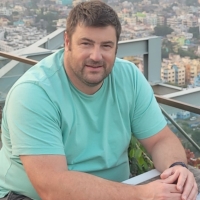
Dr. Andrew Henderson is the Deputy Director of the UKRI GCRF Living Deltas Research Hub. He has a B.Sc. (Hons) in Natural Sciences from Durham University and a M.Res. in Environmental Sciences and a Ph.D. in Physical Geography from University College London. A broadly trained biogeochemist, his work focuses on the impacts of climate change and people on contemporary and past environments in tropical and monsoon regions using the geochemistry of modern river and lake waters. He has been part of the Living Deltas team that has been responsible for establishing delta-wide water quality monitoring programmes in the Ganges-Brahmaputra-Meghna (India, Bangladesh), Red River, and Mekong (Vietnam) delta systems, as well as assessing human impacts and land use change on lake and pond ecosystems over the 20th Century.
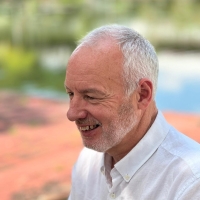
Dr. Andy Large is Professor of River Science in the School of Geography, Politics and Sociology at Newcastle University, UK. Andy has over three decades experience of researching river and wetland ecosystems in the UK, Europe, South Africa, and South and Southeast Asia, focusing on how extreme events and climate change affect catchment vulnerability and resilience with an especial focus on Asian mega-deltas. Most recently Andy was Principal Investigator and Director of the Living Deltas Hub (£15.3m, 2019-24: www.livingdeltas.org) funded by UK Government through its Global Challenges Research Fund. Working through equitable partnerships with delta communities, researchers, government ministries, the FCDO, UN and international agencies, NGOs, and emphasising a natural-cultural heritage-sensitive approach, the Living Deltas Hub has produced an extensive evidence base around ecosystem degradation and change, livelihood diversification, delta tipping points, hazard and risk.
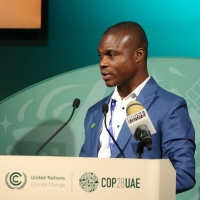
Amb. Freeman Elohor Oluowo is the Global Coordinator and Focal person for the DeltasUNite and championing a new United Nations (UN) Convention for Conserving River Deltas (UN-CCRD) with diverse stakeholders. Currently, Freeman is the Global Gender Observer for the World Bank Group Forest Carbon Partnership Facility (FCPF), representing Africa, Latin America and the Asia-Pacific countries.
Presently, he is facilitating the establishment Environmental Sustainability Clubs (ESC) in secondary schools in Nigeria, Jurisdictional REDD+ programs that are actively led and driven by local communities in the Nigerian Niger Delta States. He holds an International Masters (M.Sc) degree in Marine-based Ecosystems Management and Climate Change, Masters (M.Sc) degree in Environmental Quality Management. Others are, Diploma in Climate Change Adaptation, Resilience Fisheries, Laws of the Seas, Project management, Health Safety and Environment, Monitoring and Evaluation.
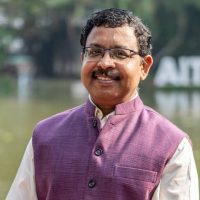
Dr. Indrajit Pal is an Associate Professor and the Chair in the Disaster Preparedness, Mitigation and Management in, Asian Institute of Technology, Thailand and has more than 20 years of experience on interdisciplinary research. His research area includes disaster risk governance, vulnerability, risk and resilience assessment, climate risk, critical infrastructure resilience and DRR. Dr. Pal has published 15 books and over 200 academic papers and book chapters.
Dr. Pal has been involved in 38 sponsored research projects in Asia Pacific region. Some of his recent project involvement includes risk characterization in Asian Delta communities in the “Living Deltas HUB” (UKRI/GCRF), Operational Foresight and Supporting Local Preparedness in the Context of Climate Displacement (IOM), Strengthening climate resilience of agricultural livelihoods in Savannakhet Province, Lao PDR through participatory Ecosystem-based Adaptation (MTT/SEI/DFAT) and Climate Resilient Infrastructure for Social Transformation and Adaptation (ADPC/World Bank).
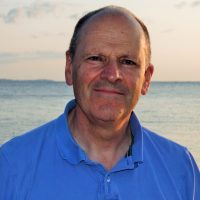
Dr. Robert Nicholls has long experience of analysing long-term coastal problems and solutions from a systems perspective. Much of his work has focused on sea-level rise and climate change, and also the future of populated deltas. He is a longstanding contributor to Intergovernmental Panel for Climate Change (IPCC) assessment process (1992 to 2019). He was formerly Director of the Tyndall Centre for Climate Change Research based at University f East Anglia and Professor of Coastal Engineering at University of Southampton and still works with both institutions.
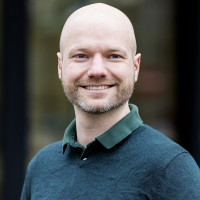
Prof. Dr. Minderhoud specializes in coastal-deltaic environmental change. His research spans geomorphology, geology, and remote sensing, focusing on coastal elevation, land subsidence and relative sea-level rise. He develops numerical capacities to improve spatial-temporal assessments of current and projected future deltaic subsidence and delta elevation change, aiding science-informed development of effective management strategies, like sediment-enhancing strategies or land subsidence control. His work extends to diverse regions, including the Mekong delta and other coastal-deltaic areas in South Asia, West Africa, and Europe. As co-founding of the International Panel of Land Subsidence (IPLSubsidence.org) and member of UNESCO’s International Land Subsidence Initiative (LaSII), Dr. Minderhoud actively thrives to to avoid human-accelerated land subsidence, reduce future relative sea-level rise and increase the resilience of deltas and lowly-elevated coastal areas worldwide.
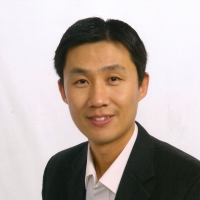
Dr. Kehui (Kevin) Xu is Director of Coastal Studies Institute and Professor of Department of Oceanography and Coastal Sciences in College of Coast & Environment at Louisiana State University, Baton Rouge, USA. Dr. Xu is a geological oceanographer whose research is focused on coastal restoration, sediment diversion, sediment management, coastal morphodynamics, sediment transport, sedimentary geology, and coastal processes.
Dr. Xu has published a total of 118 peer-reviewed journal articles. Since joining LSU, Dr. Xu has been holding the James P. Morgan Distinguished Professorship. Dr. Xu has been serving as Associate Editor of Estuarine, Coastal and Shelf Science, a highly respected, international, multidisciplinary journal.
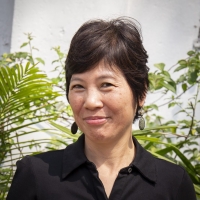
Dr. Hue Le is senior researcher and lecturer at Vietnam National University Central Institute for Natural Resources and Environmental Studies (VNU-CRES) in Hanoi. Dr. Le’s research focuses on natural resource management, land tenure, climate change, migration and gender. Her research provides insights into the differentiating effects of macro policy and investigates how social differentiation and power relations affect the way in which different classes of people use the resources and the income that each class earns from forest-related resources. More recently, she employs social theories and interdisciplinary disciplines in her work to evaluate socio-ecological resilience in Vietnamese mangroves in the Red River Delta and evaluate management options to enhance delivery of benefits and services across multiple scales.
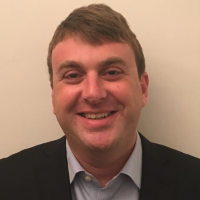
Mr. Bradley Mellicker is the Head of IOM’s Climate Mobility Innovation Lab in Asia and the Pacific. Prior to this position, Brad was Senior Regional Emergency and Post Crisis Specialist in Asia and the Pacific, focusing on a series of issues linked to disaster risk reduction, emergency preparedness, humanitarian response, and recovery. Prior to that, he worked with IOM Iraq, overseeing large scale work related to internal displacement, stabilization, recovery and durable solutions. Earlier, Brad worked in the private sector supporting renewable energy projects in developing markets; held several other positions with IOM, including in Guinea, Cameroon, the Philippines, Haiti and Timor-Leste; and with the Office of the Prosecutor at the UN International Criminal Tribunal for the former Yugoslavia in The Hague. Brad holds BAs in History and Political Science, a Juris Doctor (law) and an MA in International Human Rights. He is admitted to practice law in Colorado, USA.
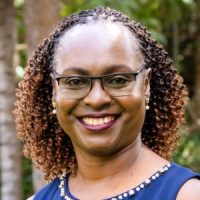
Ms. Irene is a Special Adviser to the African Climate Foundation (South Africa) and a Justice, Equity, Diversity, and Inclusion Adviser for ClimateWorks Foundation (US). She was previously the Africa Director for Climate at the Children’s Investment Fund Foundation (CIFF) and the NIRAS Africa Director. She has over 30 years of relevant international experience in climate change, natural resource management, monitoring, and evaluation in more than 13 African countries. For 18 years she was a development consultant providing policy and programme development, implementation, and M&E services in the climate, natural resources, and development sectors to governments, bilateral and multilateral agencies, civil society, and private sector clients in Africa, Europe, and the United States. She is the author and co-author of several peer-reviewed papers and articles on climate change and measuring resilience. She has also contributed and continues to contribute to several global, regional, and national discussions on Africa’s opportunities and challenges in addressing climate change.

Dr. Faith Ka Shun Chan is a Professor at the University of Nottingham Ningbo China (UNNC).
He specialised in sustainable flood risk management, climate adaptations and urban resilience in Asian coastal megacities. He is currently funded by the Chinese National Research Council (NSFC) as principal investigator on the RFIS-awarded project on sustainable urban flood risk management and climate resilience and the international youth project on microplastics and their impacts on urban rivers.
He is also a Principal Investigator on three municipal-funded projects to investigate the surface water quality, typhoon-enhanced flood risk, and the development of a “Sponge City” pilot study in Ningbo, the total funding he awarded has been over 2 million RMB. His “Sponge City” paper in the Land Use Policy received the top cited notification in 2020.
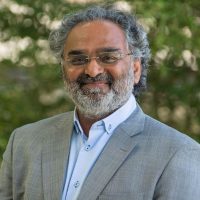
Dr. Asim Zia‘s research, teaching and outreach activities focus on advancing the sustainability and resilience of integrated socio-environmental systems. He has led 26 NSF, USDA, NOAA and McArthur foundation funded Team Science projects, and published 107 articles & book chapters, aimed at harnessing science, nature and diplomacy to foster cooperation, sustainability and resilience. Asim Zia is currently serving as a Professor of Public Policy and Computer Science, an Associate Dean of Research in the College of Agriculture and Life Sciences, and Director of University of Vermont’s Institute for Environmental Diplomacy and Security, and Ph.D. program in Sustainable Development Policy, Economics and Governance.